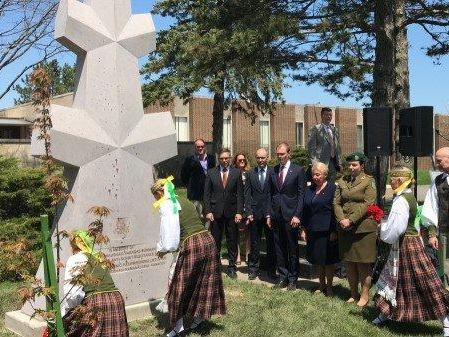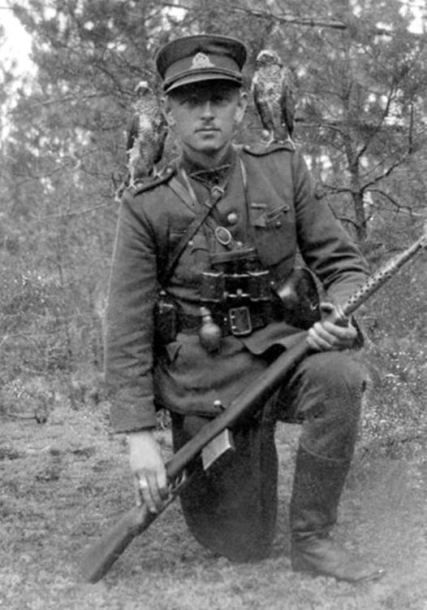Monument for Lithuanian 'Nazi collaborator' in Chicago sparks international row
Memorial called 'morally untenable and offensive to the memory of the Holocaust victims'

Your support helps us to tell the story
From reproductive rights to climate change to Big Tech, The Independent is on the ground when the story is developing. Whether it's investigating the financials of Elon Musk's pro-Trump PAC or producing our latest documentary, 'The A Word', which shines a light on the American women fighting for reproductive rights, we know how important it is to parse out the facts from the messaging.
At such a critical moment in US history, we need reporters on the ground. Your donation allows us to keep sending journalists to speak to both sides of the story.
The Independent is trusted by Americans across the entire political spectrum. And unlike many other quality news outlets, we choose not to lock Americans out of our reporting and analysis with paywalls. We believe quality journalism should be available to everyone, paid for by those who can afford it.
Your support makes all the difference.An international row has erupted after a monument to a Lithuanian war hero alleged to have collaborated with the Nazis was erected in Chicago.
The memorial to Adolfas Ramanauskas, who led anti-Soviet resistance during World War Two, was installed in the Illinois city last week in a ceremony attended by Lithuania’s foreign minister.
It has has been criticised as "offensive" by Russia and a US-based Jewish human rights organisation, the Simon Wiesenthal Centre, which researches the Holocaust and antisemitism.
The centre said Ramanauskas led a vigilante gang that persecuted Jews after the Nazis invaded Lithuania in 1941.
Russia’s America embassy accused Lithuania of glorifying “Nazi collaborators and Holocaust henchmen, portraying torturers as victims”.
It called the unveiling of the monument “especially cynical, since it almost coincided with the Holocaust Remembrance Day”.
The Lithuanian foreign ministry responded furiously, tweeting the embassy to say: “You will not drag us down to your level.”
The ministry on Tuesday summoned a Russian diplomat to Vilnius to “protest false statements about the "anti-Soviet guerrilla hero".
“It is most inappropriate for Russia to accuse him of collaboration with the Nazis or of participation in the Holocaust," it said in a statement. "His impeccable reputation has been confirmed by numerous independent experts researching the historical events and archival documents of that time.”
Ramanauskas – known as Vanagas, or “hawk” – was working as a teacher when the Soviet Union recaptured Lithuania from Nazi Germany in 1944.
He joined the anti-Soviet resistance and rose from platoon commander to be chairman of the Lithuanian Freedom Fighters.

But the Simon Wiesenthal Centre said Ramanauskas led a gang of vigilantes who persecuted the Jewish community of Druskininkiai in the weeks after the Nazis captured Lithuania from the Soviets in 1941. Ramanauskas had written about these activities in his memoirs, researchers added.
“Though there is no proof that he himself directly murdered anyone, it is the centre’s position that his leadership during this period of persecution should automatically disqualify him from being declared a national hero,” the centre said.
It described the Chicago monument as “morally untenable and offensive to the memory of the Holocaust victims in Lithuania”.
There were an estimated 210,000 Jews living in Lithuania when the Nazis invaded the country. The vast majority of them were murdered within months.
In 2017, the Simon Wiesenthal Centre’s chief Nazi-hunter and Holocaust historian, Efraim Zuroff, met with Lithuanian MPs in a bid to convince them not to honour Ramanauskas.
But the Lithuanian government insists the freedom fighter ran a “property protection unit” that merely guarded homes and shops following the Nazi invasion and did not target Jews.
Ramanauskas was captured by the Soviets in 1957 and executed.
He was awarded posthumous military honours following Lithuanian independence in 1990. Last year, he was given a state funeral after his remains were discovered in Vilnius.
Join our commenting forum
Join thought-provoking conversations, follow other Independent readers and see their replies
0Comments